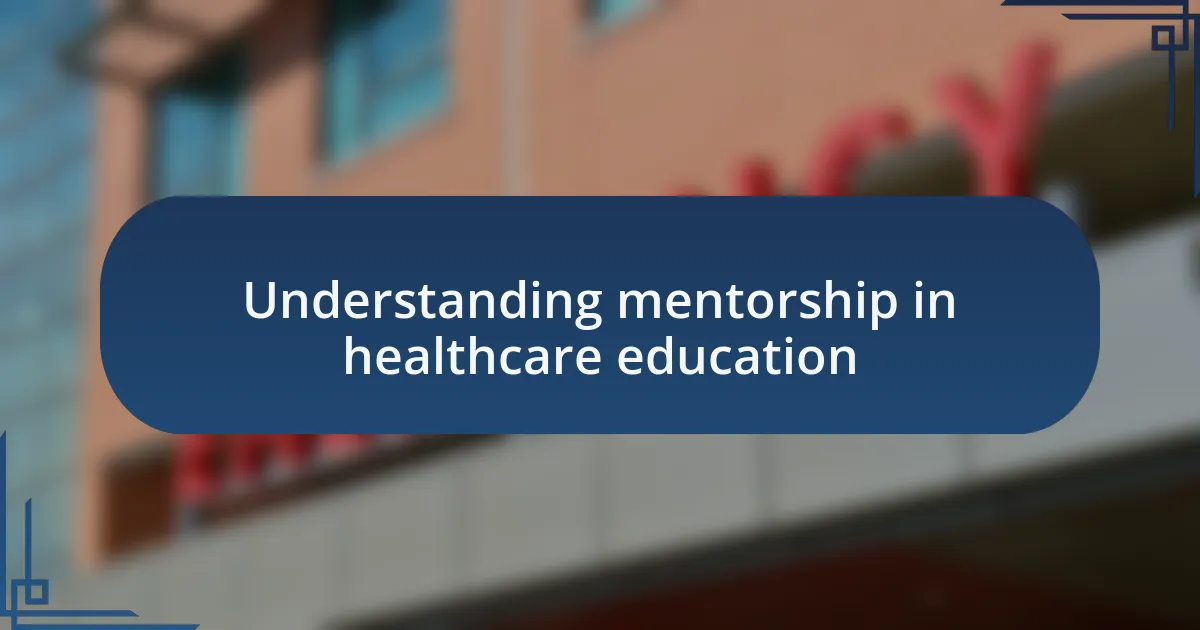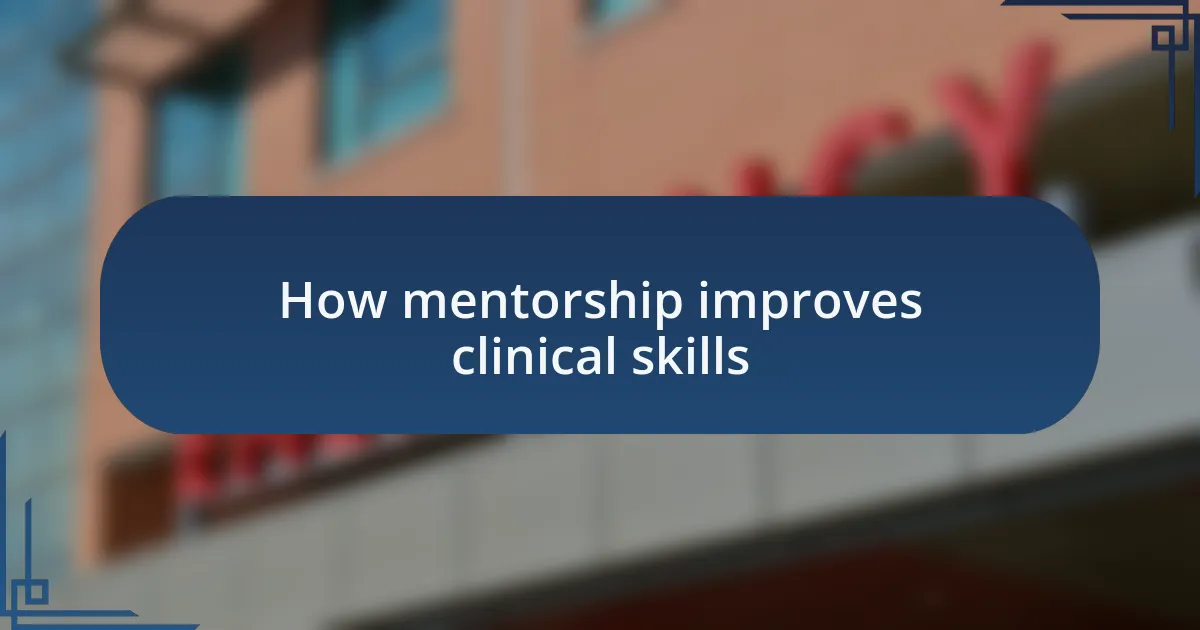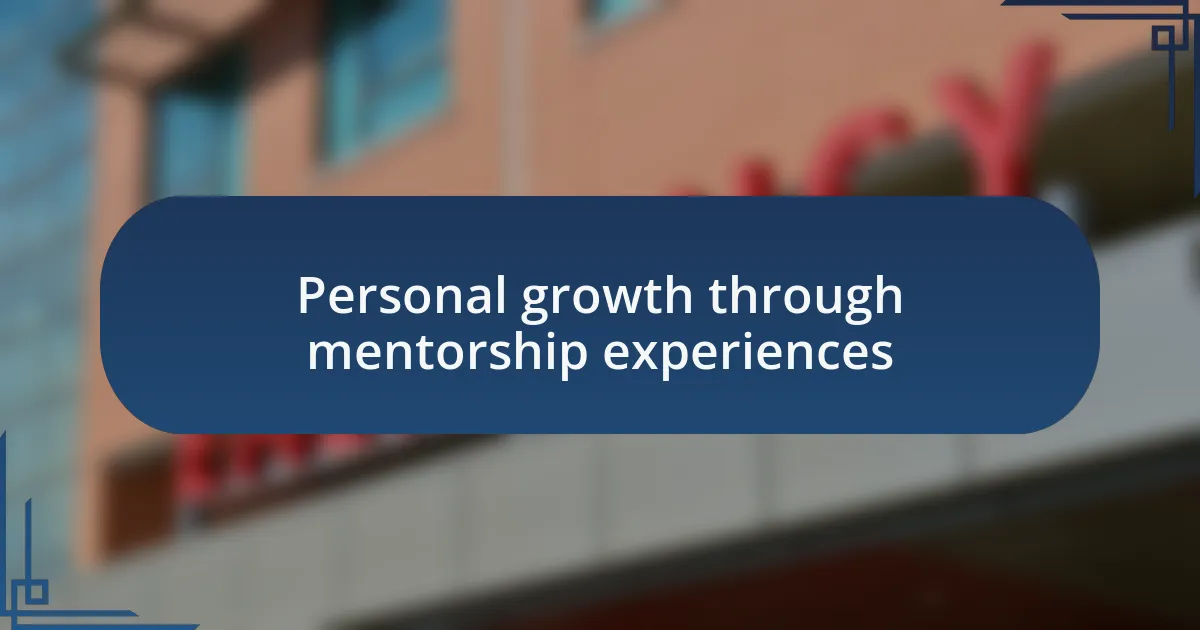Key takeaways:
- Mentorship in healthcare education provides personalized feedback, emotional support, and fosters confidence in critical decision-making.
- It enhances clinical skills through hands-on experience, experimentation, and reflective practices that improve clinical reasoning.
- Mentorship develops leadership skills by encouraging collaboration, resilience, and the exploration of diverse leadership styles.
- Personal growth occurs through stepping outside comfort zones and sharing vulnerabilities, ultimately leading to a desire to give back as a mentor.

Understanding mentorship in healthcare education
Mentorship in healthcare education is a fundamental relationship that can shape the careers of aspiring professionals. I still remember my first mentor at the hospital, a seasoned nurse who not only taught me the practical skills I needed but also encouraged me to explore the emotional intricacies of patient care. Reflecting on that experience, I often wonder: how many budding healthcare workers pass up opportunities for guidance that could profoundly influence their journey?
At its core, mentorship is about sharing knowledge and experiences. When mentors share their stories—both successes and failures—it creates a layer of trust and understanding. I recall a particularly difficult case my mentor shared that taught me the importance of resilience. Having someone to turn to during challenging situations not only offers practical advice but also emotional support, reminding us that we’re not alone in our struggles.
This learning dynamic extends beyond just acquiring skills; it helps build confidence in making critical decisions. Have you ever faced an ethical dilemma in healthcare and wished for someone to guide you? I certainly have. My mentor’s insights during such moments have empowered me to stand firm in my choices, deepening my appreciation for mentorship’s role in shaping both personal and professional integrity in the healthcare field.

Key benefits of mentorship relationships
One of the most profound benefits of mentorship relationships is the opportunity for personalized feedback. I vividly remember a time when my mentor scrutinized my patient assessments, highlighting both strengths and areas for improvement. Did that feedback sting at first? Absolutely. But it was this constructive criticism that helped me refine my skills and ultimately feel more competent in my role. Each session with my mentor felt like a chance to grow—an invaluable aspect of professional development.
Mentorship also fosters invaluable networking opportunities. I still cherish the moment my mentor introduced me to a group of professionals at a healthcare conference. This wasn’t just another event; it felt like unlocking a door to new connections. How many times have we wished for a foot in the door in our field? Those introductions opened up collaborations that have significantly enriched my knowledge and career path.
Additionally, mentorship instills a sense of accountability. I recall a particularly ambitious project I was hesitant to start; my mentor’s belief in my potential pushed me to take that leap. It made me realize that having someone who believes in you can be a catalyst for action. So, consider this: how much more could we achieve if we had consistent encouragement and support? That ongoing accountability can transform aspirations into tangible accomplishments in our healthcare careers.

How mentorship improves clinical skills
Mentorship plays a critical role in honing clinical skills through hands-on experiences. I remember the first time I performed a complex procedure under my mentor’s watchful eye. It was nerve-wracking to say the least, but having someone experienced to guide me in that moment made all the difference. They not only provided tips but also shared their own stories of mishaps and successes, emphasizing that every experience, good or bad, is a stepping stone to mastery.
I’ve often found that mentorship creates a safe space for experimentation. While working with my mentor, I was encouraged to try new techniques and approaches that I wouldn’t have dared to attempt solo. It’s exhilarating to think about how those moments led me to discover my own unique style of patient care. Don’t you think that kind of freedom in learning can be a game-changer in developing confidence as a clinician?
Moreover, the reflective nature of mentorship deepens learning. After a particularly challenging day, my mentor and I would debrief together. Discussing what went well and what didn’t allowed me to critically analyze my actions. This practice didn’t just improve my clinical skills; it shaped my clinical reasoning, paving the way for more effective decision-making in future scenarios. Isn’t it insightful how dialogue can transform challenges into valuable lessons?

Developing leadership through mentorship
Developing leadership through mentorship is often a gradual yet rewarding journey. I’ll never forget when my mentor entrusted me with leading a team project during a critical phase of our clinic’s operations. It felt daunting, but they were there to support me. They taught me not just the technical aspects of leadership, but how to foster collaboration and motivate my team. Wasn’t it empowering to know that nurturing my leadership skills was as important as mastering my clinical expertise?
In my experience, mentorship goes beyond simple guidance; it’s about cultivating a mindset of leadership. I recall a moment when my mentor challenged me to look at conflicts within our team as opportunities for growth rather than obstacles. This perspective shift reshaped how I interacted with my colleagues and made me more resilient. Isn’t it fascinating to realize that through mentorship, I learned to lead by example, ultimately creating a more cohesive and empowered team?
Furthermore, mentorship allows for the exchange of diverse leadership styles. I’ve had the privilege of learning from several mentors, each offering different approaches and philosophies. One mentor advocated for servant leadership, emphasizing the value of empathy and service to others. Another focused on strategic thinking and innovation. This variety not only enriched my understanding of what leadership can entail, but it also encouraged me to develop my own authentic style. How can we underestimate the power of learning from those who have paved the way?

Personal growth through mentorship experiences
Personal growth through mentorship experiences often stems from stepping outside of one’s comfort zone. I remember a time when my mentor suggested I present at a regional healthcare conference. The thought terrified me—I questioned my knowledge and speaking skills. Yet, with their encouragement and feedback, I not only honed my presentation but also discovered a newfound confidence in sharing my expertise. Isn’t it remarkable how a little push can unlock potential we never knew existed?
Another profound aspect of mentorship is the invaluable learning that comes from vulnerability. During one of my mentorship sessions, I shared my struggles with work-life balance. Instead of offering just solutions, my mentor opened up about their own journey, including their missteps and lessons learned. It was a moment of connection that made me realize I wasn’t alone in my challenges. This dialogue helped me grow not just professionally, but personally, illustrating the deep impact mentorship can have on our lives.
Finally, my mentorship experiences have taught me the importance of giving back. I vividly recall when I was encouraged to become a mentor myself. Initially hesitant, I soon found joy in guiding others while reflecting on my journey. This process of helping others grow solidified my own learning and deepened my understanding of the challenges new professionals face. Isn’t it intriguing to think that personal growth can come full circle through mentorship?